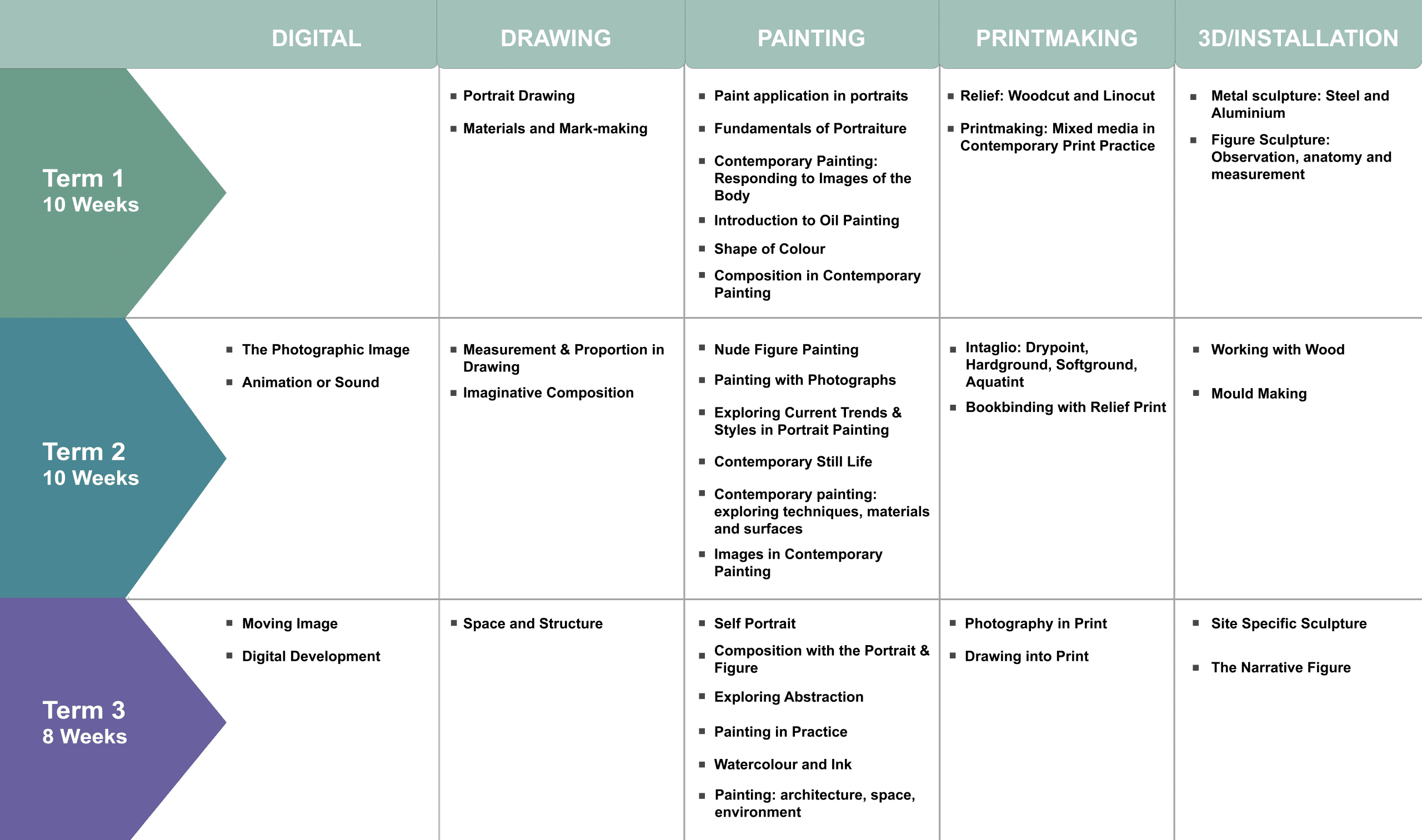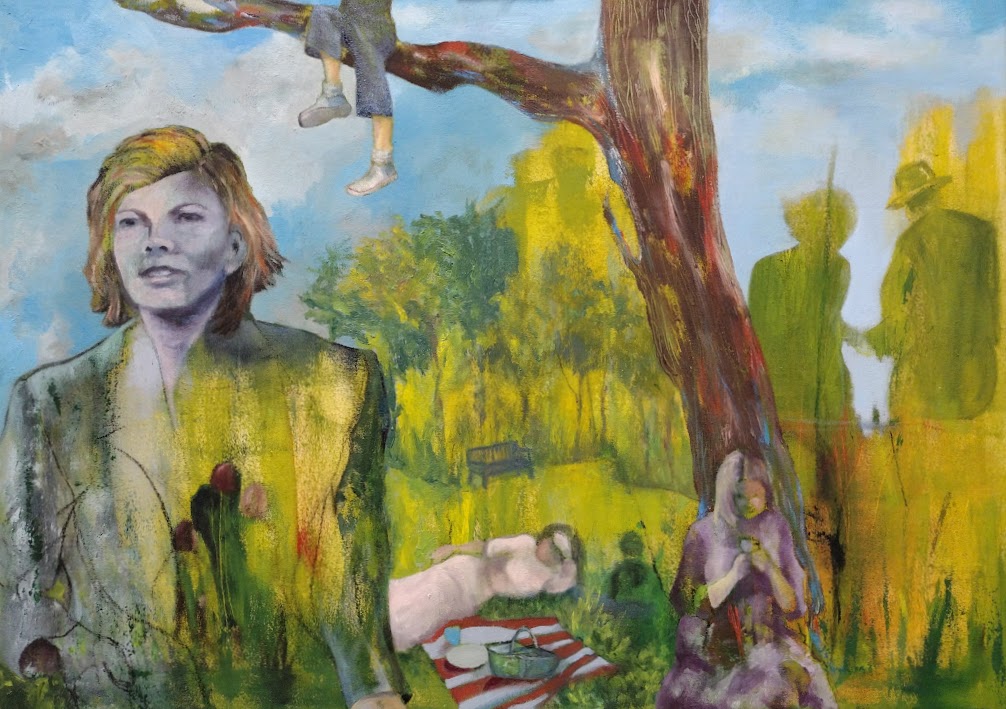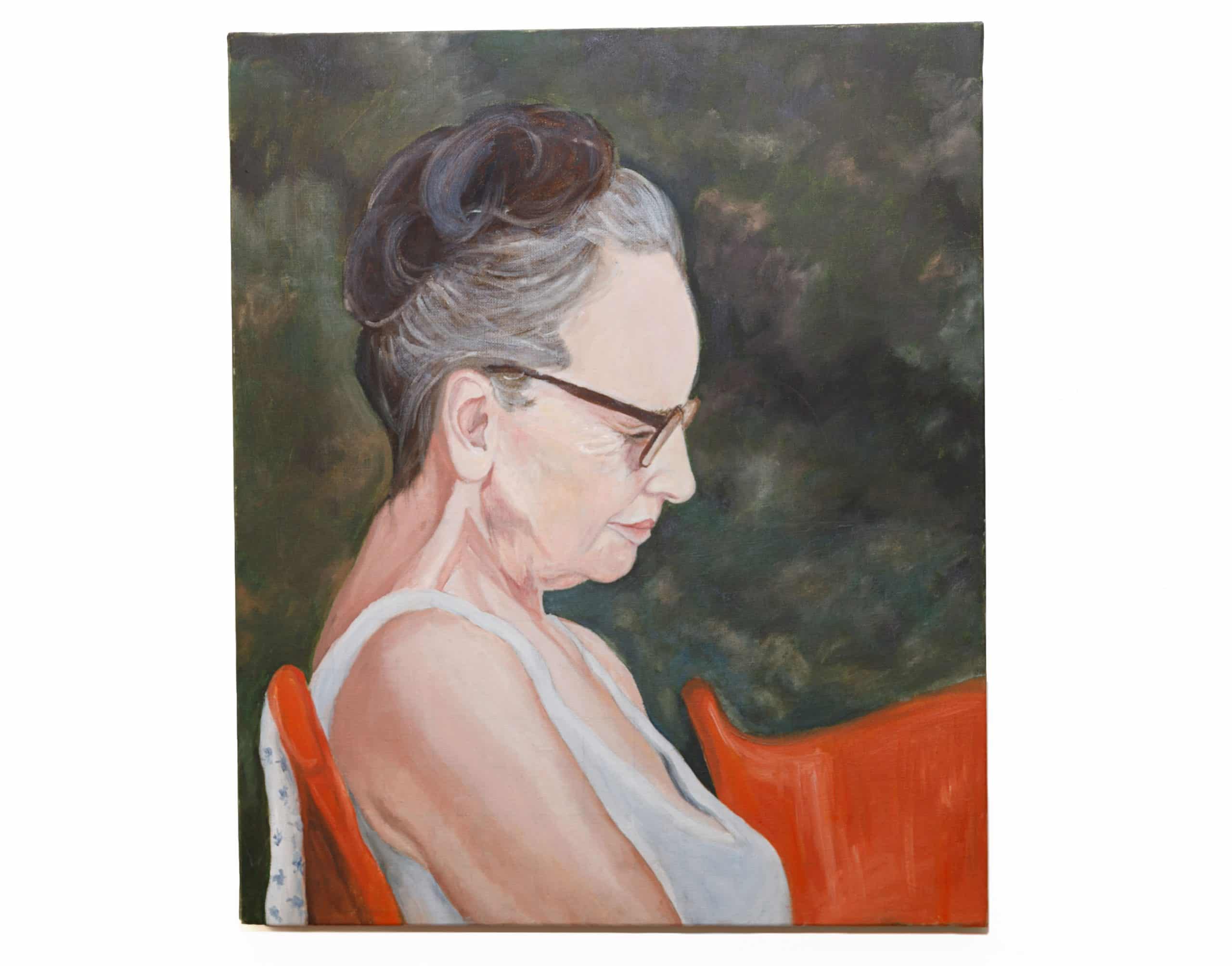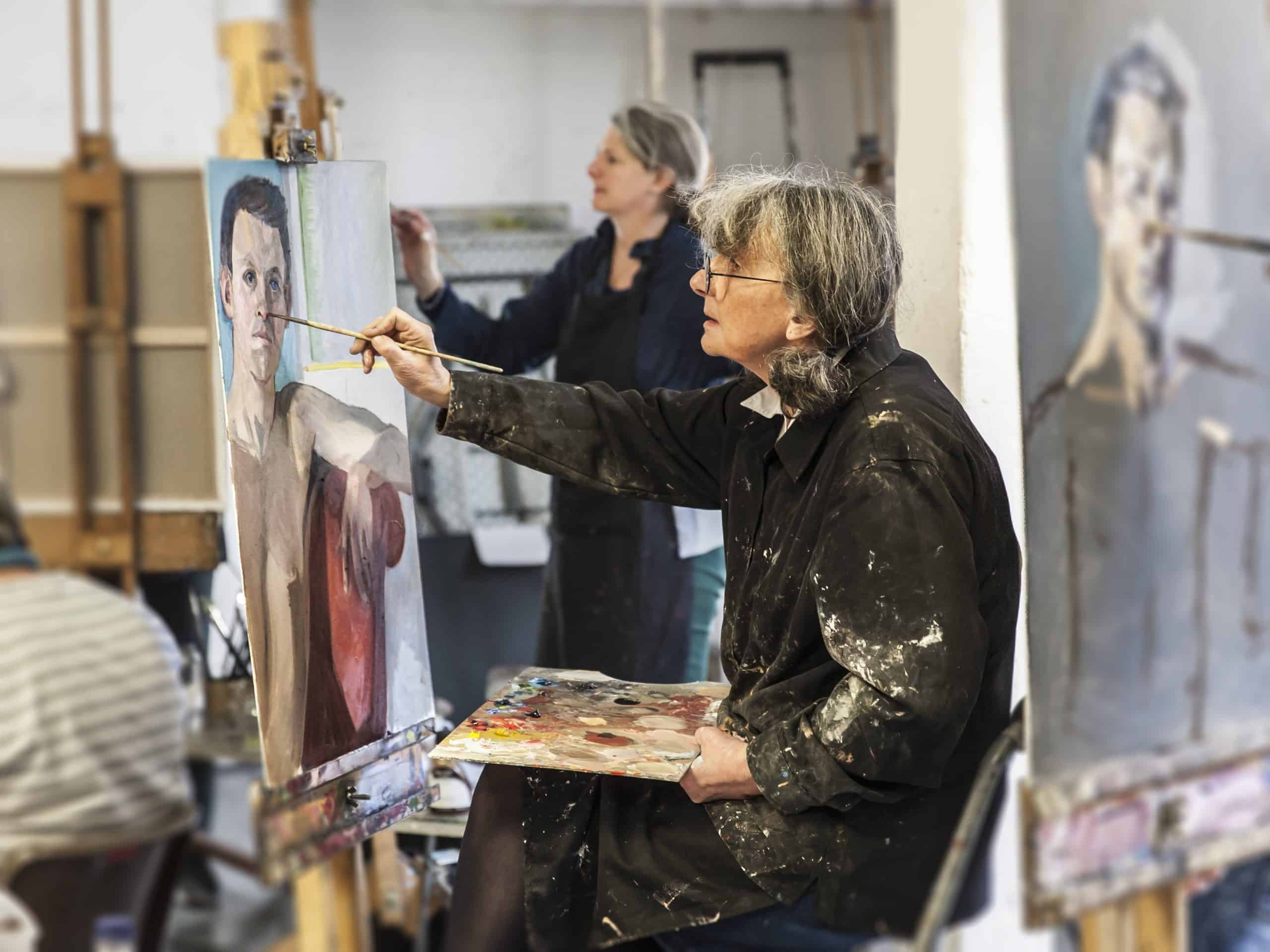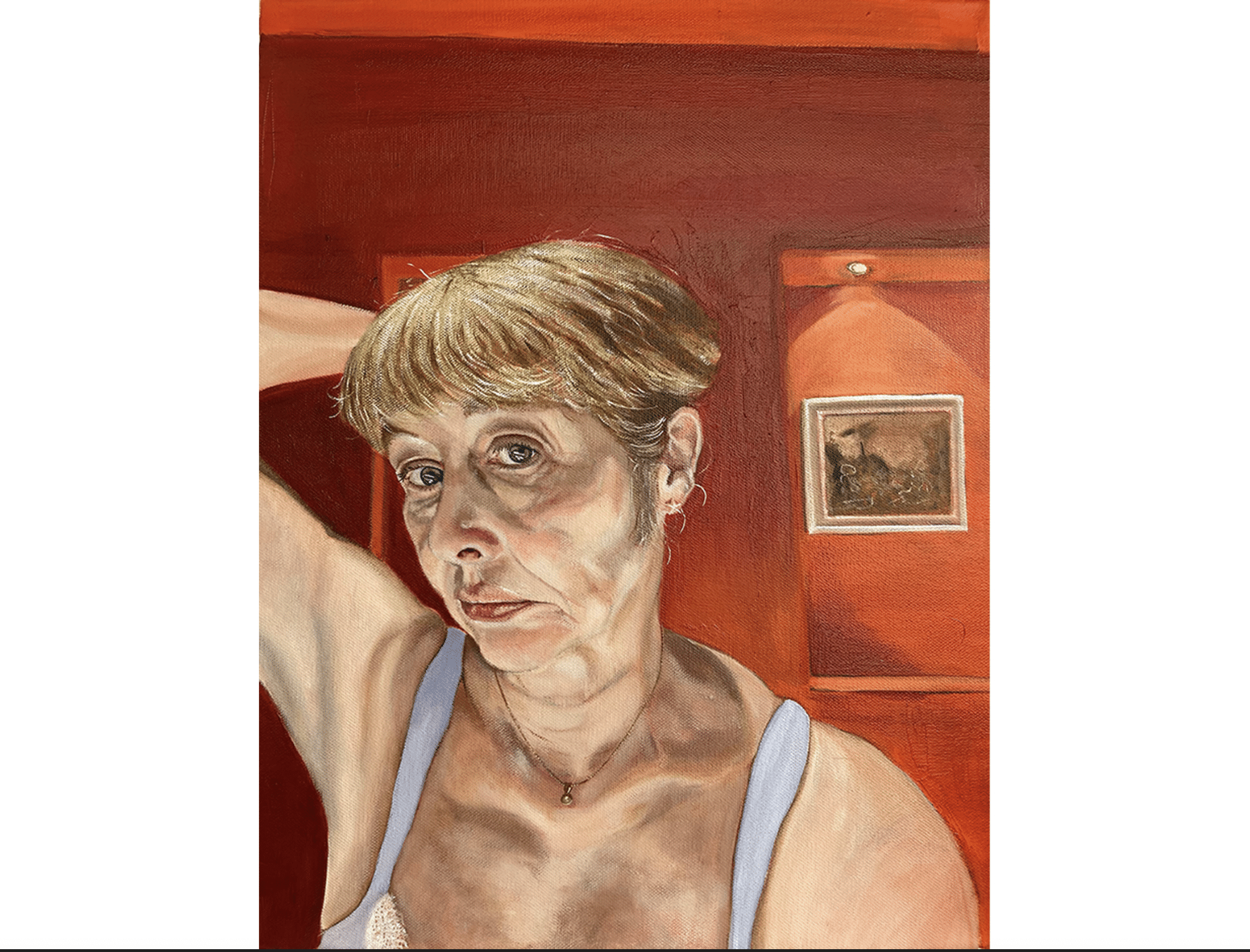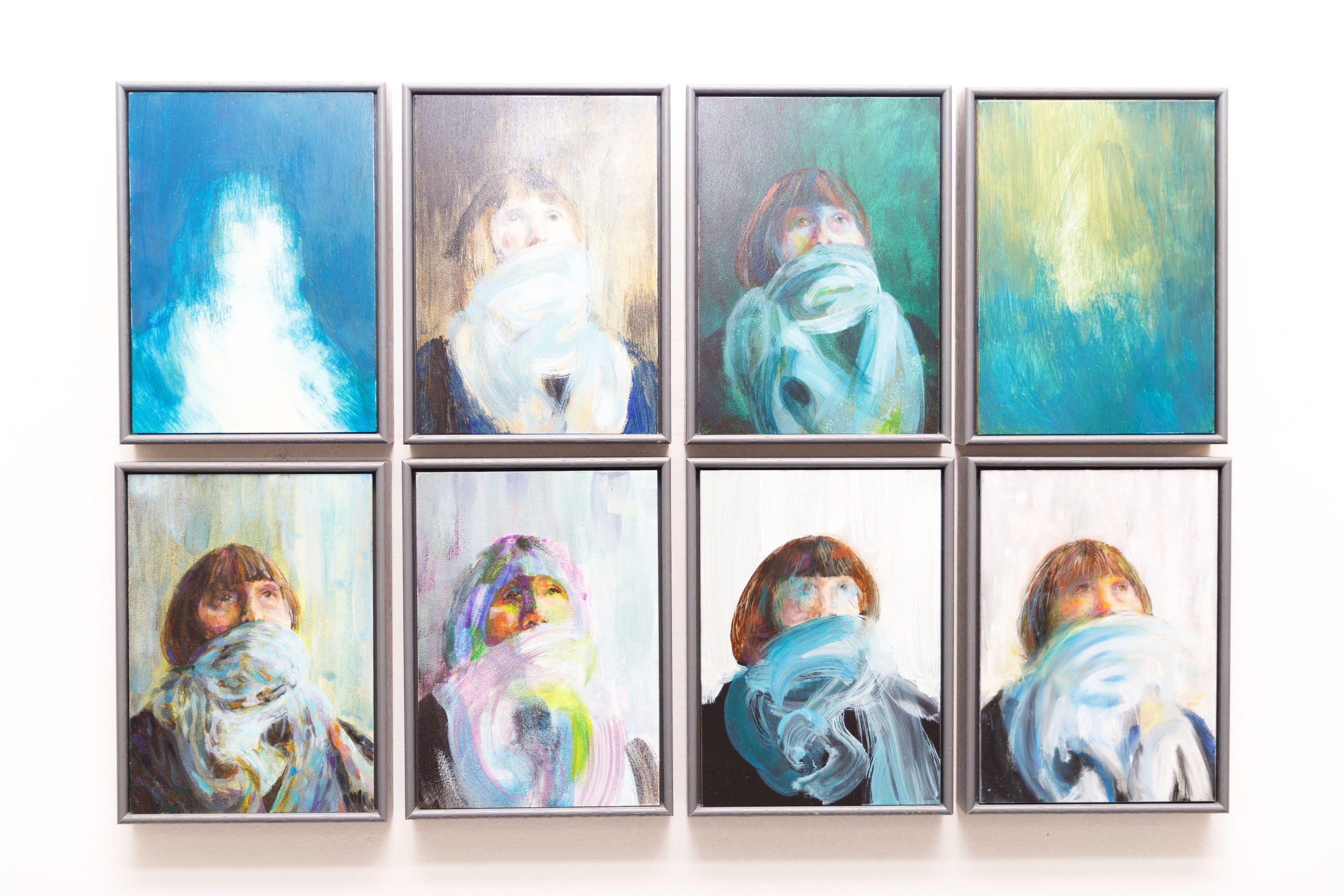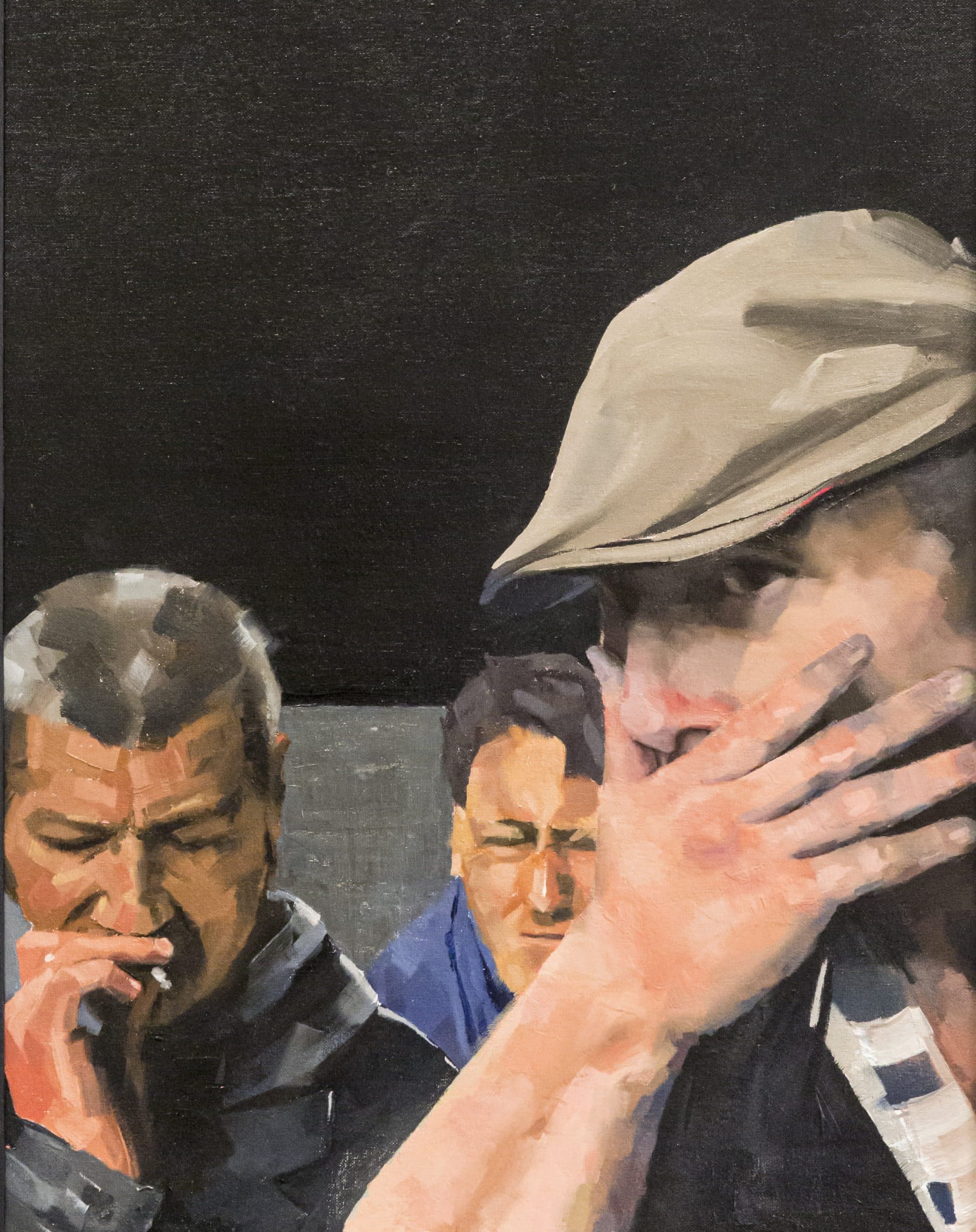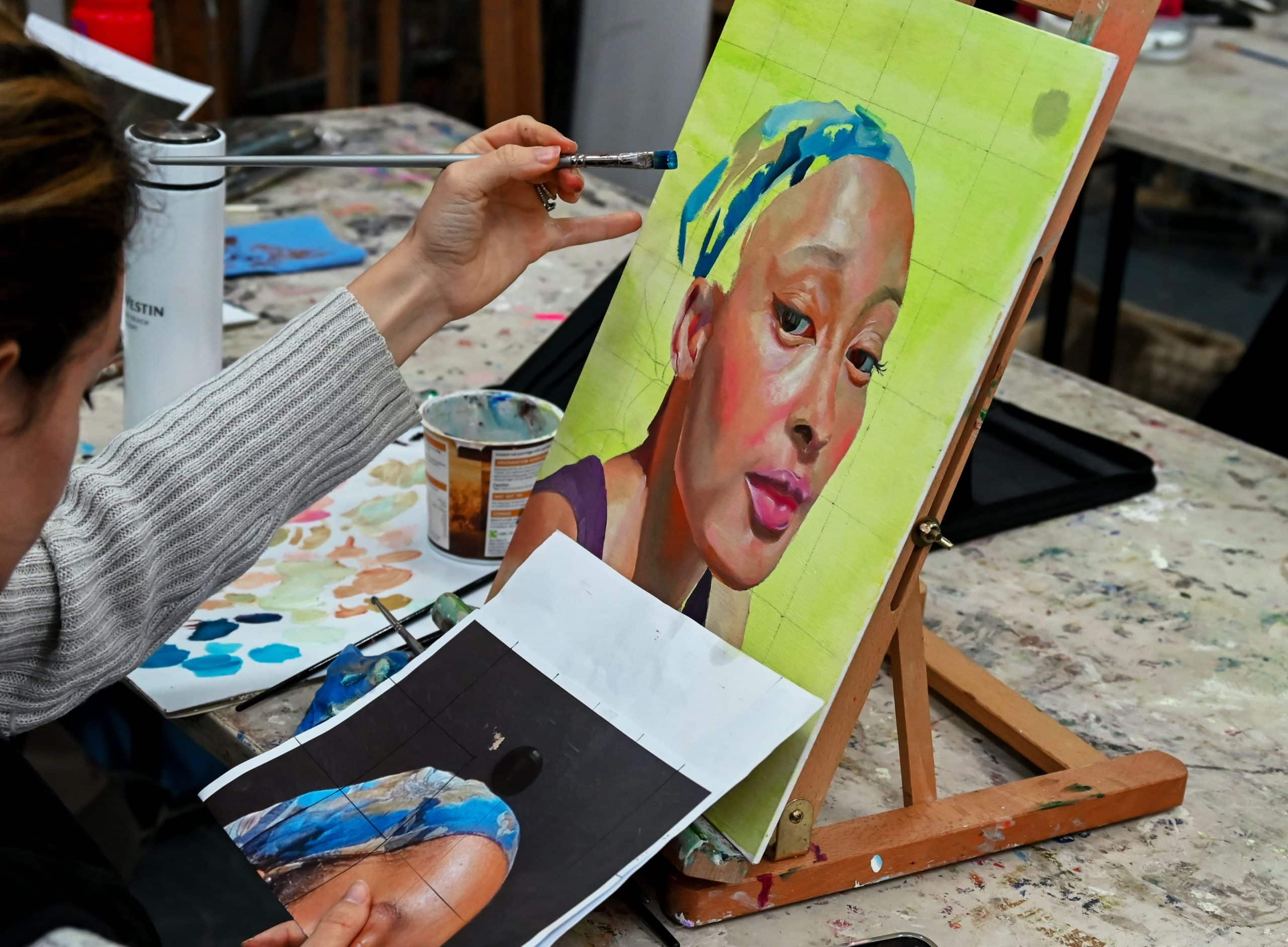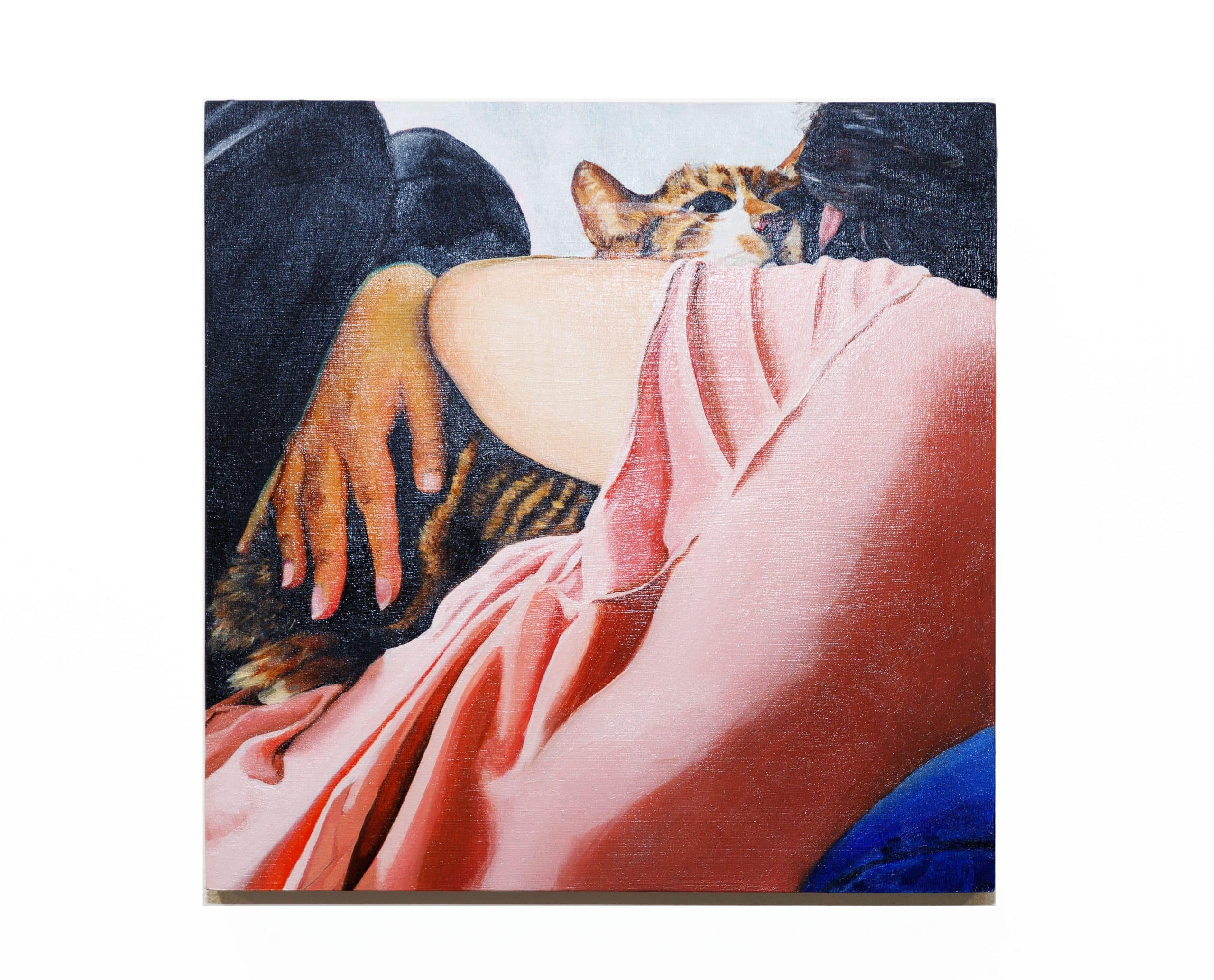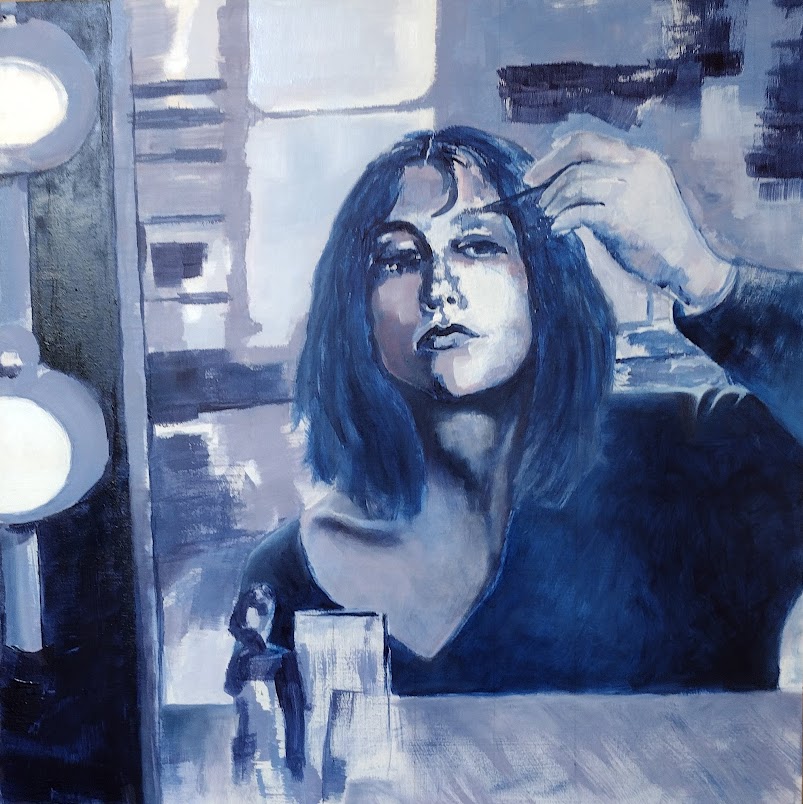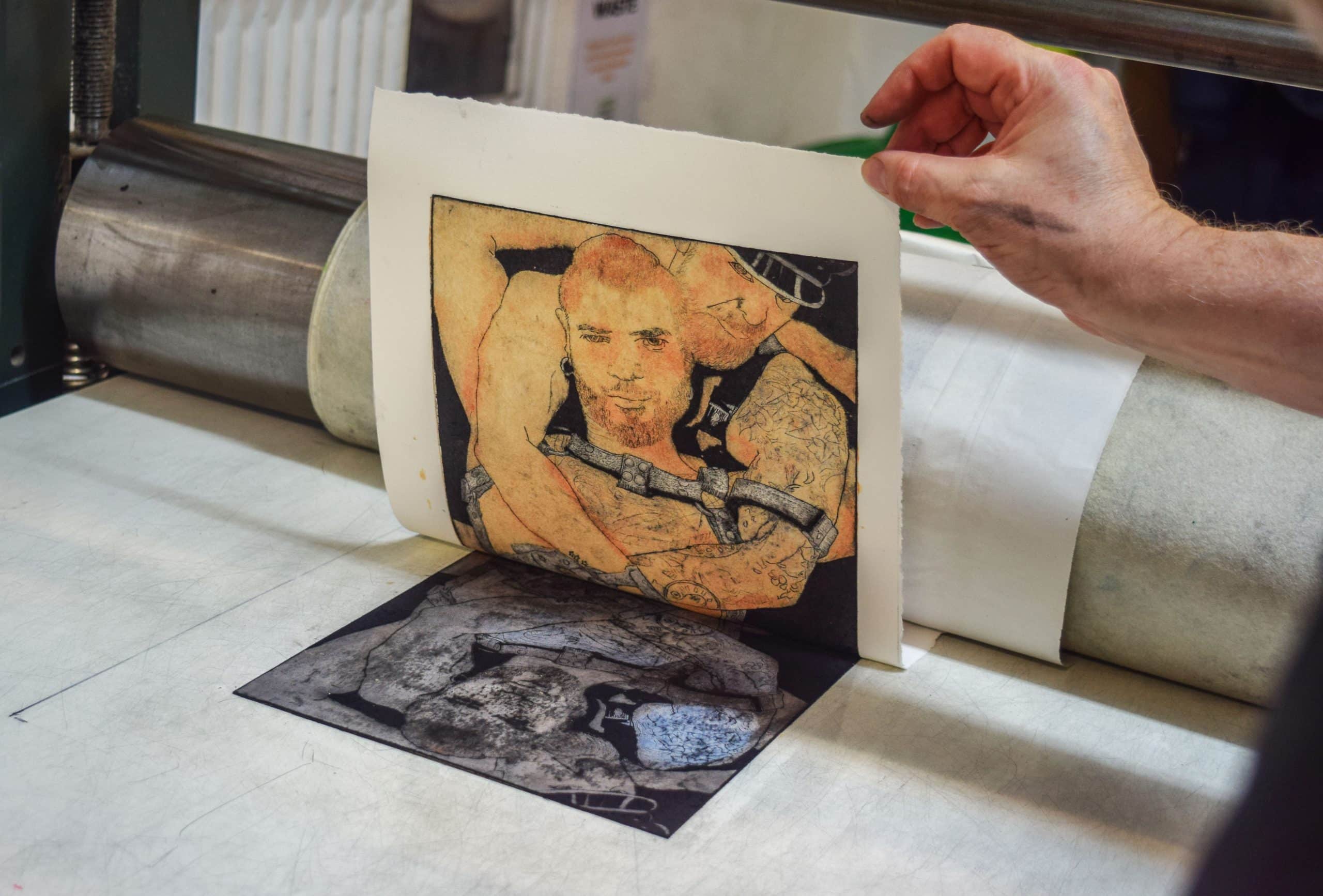Certificate in Portraiture
Our Certificate in Portraiture provides a unique introduction to the exacting discipline of portraiture
APPLYThe Certificate in Portraiture combines a range of portrait and figure painting classes, including figure painting (both clothed and nude), portrait painting, self portrait, portrait drawing and anatomy. You’ll learn about tone and colour, mixing flesh tones, lighting the model, composition and much more. Classes include the study of a variety of techniques, including different approaches to paint application, colour mixing, using egg tempera and working in oil or acrylic. You will be required to take a number of specified Elective courses in order to complete the programme.
The Certificate is internally awarded; it is not part of the RQF (The Regulated Qualifications Framework) and can’t be used as credit for another qualification.
For more information about open days or to booking a one to one chat/tour please visit our open days page here. You can also call our Academic team on +4 4 (0) 2 0 7 4 0 7 6 9 6 9.
What you will study
The Certificate in Portraiture is typically one full day (10.30am-4.30pm) a week, completing six modules over two years. It can also be completed in an accelerated mode; two full days a week over one year.
The programme is designed to fit around students’ busy lives and can be paused as often as necessary (with advance notice and for whole terms, only). There is no time limit to completing the Certificate, and students can move between the standard and accelerated mode from term to term.
In either mode the Certificate in Portraiture can be started at the beginning of any of the three terms throughout the year.
The Certificate in Portraiture course is not formally assessed (nor is it necessary to complete work outside of the taught sessions). You will, however, need to meet the minimum attendance requirement (80%) and complete all six modules to pass the programme. At the end of the Certificate in Portraiture you will have the opportunity to exhibit your work at the Graduate Show, and exhibit your work alongside students from across our academic programmes.
Students are also able to take advantage of free places on the Academy’s public courses, which are subject to availability at the discretion of the Academy.
Our Teaching Approach
Our teaching body is second to none. All our tutors are practising artists in their own right. They include prize-winning artists, artists with work in national collections and members of leading arts organisations.
Central to our philosophy is that teaching and learning should be in small, supportive groups: our tutors get to know students individually and students learn from both the tutor and from each other within teaching groups not exceeding 15 people.
Please see the 24/25 Certificate Programme Handbook, Student Handbook and Student Terms and Conditions for more information.
Please see the 25/26 Certificate Programme Handbook*, Student Handbook*, and Student Terms and Conditions for more information.
*Please note handbooks maybe subject to change and will be reissued upon enrolment.
For more information about open days or to booking a one to one chat/tour please visit our open days page here. You can also call our Academic team on +4 4 (0) 2 0 7 4 0 7 6 9 6 9.
Elective Skills Workshop Courses
Click on the image to enlarge
*This mapping document is illustrative of the types of Elective Skills Workshops options available within an academic year. This is for your guidance only and the Elective Skills Workshop Courses courses offered each term are subject to change.
Electives are allocated on a first come first serve basis per term and we cannot reserve places in advance or guarantee places on your first choice of electives.
The programme is made up of six modules called Elective Skills Workshop Courses. These courses are common components to all our academic programmes at the Academy, so you will be working alongside a diverse group of students from across our courses. You will choose your Electives from a range available each term. The day you attend will be dependent on the course you choose each term.
The Certificate is a flexible programme and can be customised to your needs. Should you want to take a course in more than one discipline at the same time (painting and drawing, for instance), this can be arranged since the skills classes take place on different days.
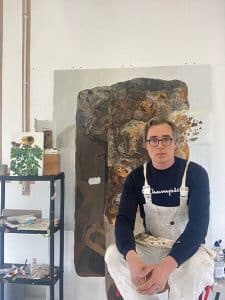
You will have a tutorial each term with the Certificate in Fine Art Programme Leader, Edward Sutcliffe. Tutorials are 30 minutes one-to-one and provide you with the opportunity to discuss your individual practice, goals and educational development and progression, academic and administrative issues and general wellbeing. Tutorials are available in person or via Zoom.
Our Certificate in Portraiture is taught across both of our campuses, conveniently located within walking distance of each other in the London Borough of Southwark.
Our Mermaid Court campus houses a Wood & Metal Workshop, a sculpture studio and a Library (165A Borough High Street, London SE1 1HR).
Our Bankside campus houses nine large studios, including a print room, a ceramics studio, a digital suite and painting and sculpture studios. There’s an auditorium for artist talks and lectures plus two gallery spaces, where you’ll have opportunities to show your work (185 Park Street, London SE1 9SH).
FEES 2025/26
Fees for the Certificate Programme can be paid termly or annually.
| Accelerated 1 year mode | £4,220 | £1,477 | |
| 2 year mode | £2,110 | £738.50 |
Please note, these are our 2025/26 fees. Fees are subject to annual review and are likely to increase due to inflation in the following academic years (this is capped at 5% annually).
If you opt to pay termly, fees will be subject to a 5% surcharge.
Fees can also be paid within a longer, individually agreed payment plan to spread the annual fee across the academic year. Payment plans do incur a 10% surcharge.
A deposit of £100 is also payable on acceptance of the offer (which is deducted from your first year’s tuition fee. Please see 3.2 of the Terms & Conditions for details). The Academy reserves the right to retain this deposit if you fail to enrol. If you cancel within the stated 14 calendar days this deposit will be refunded along with any other monies paid.
MATERIALS
Studying Fine Art at this level will incur costs in addition to fees, accommodation, travel and usual living expenses. Whilst some basic materials are provided for certain Elective Skills Workshop Courses, you will be required to cover the costs of other materials associated with the course.
The Academy has a small shop on site, where you will be able to purchase some materials. Some guidance on where to purchase other specialist materials is in the student handbook and Tutors can also advise you.
TRIPS AND VISITS
Some components of the programme will suggest students visit relevant exhibitions. These are quite often free as they are in commercial galleries. Where there is an entry fee, whilst we encourage you to take these trips, we understand it is not always possible, so they are not compulsory nor essential.
DEPOSIT
A deposit of £100 is also payable on acceptance of the offer (which is deducted from your first year’s tuition fee. Please see 3.2 of the Terms & Conditions for details). The Academy reserves the right to retain this deposit if you fail to enrol. If you cancel within the stated 14 calendar days this deposit will be refunded along with any other monies paid.
FUNDING
As an independent institution, our courses are not subject to public funding and as a result, there is no exemption from fees for under 19-year-olds or access to student loans.
REFUNDS
Once you’ve returned the signed contract and paid your deposit, you have a 14-day cooling-off period to change your mind. If you choose to cancel during this time, we’ll refund your full deposit. After this period, the Academy reserves the right to retain this deposit if you fail to enrol.
You’ll need to pay your tuition fees before the start of the programme. Beyond the statutory cooling off period, you must inform the Academy of your intention to withdraw. If you wish to withdraw from your course after its official start date, you will be liable for a fee. Full details of the liability can be found in our Terms and Conditions. Should you need to, you can suspend your study for an agreed period. Please see our withdrawal and interruption of study policy for more information.
Please see our Terms and Conditions for more information on Fees.
Please see our Withdrawal and Interruption of Study Policy and our Refund Policy for more information.
We welcome applications from all enthusiastic candidates. Please email academiccourses@artacademy.ac.uk or call +44 (0) 20 7407 6969 to discuss courses further or arrange a visit.
To apply, please fill out the online application form here.
If you wish to apply by post, please email admissions@artacademy.ac.uk to request an application form.
We consider each application on an individual basis and welcome candidates from a variety of backgrounds. No formal qualifications are required. We will assess an applicant’s suitability for the Certificate through a portfolio of work, personal statement and interview. Applicants must be over 18 at the time of entry and must demonstrate competency in spoken and written English, which will be judged through the applicant’s Personal Statement and interview. On receiving an application, we will offer suitable applicants an interview. In some cases, we may ask to see additional supplementary work.
PERSONAL STATEMENT
As part of your application form you’ll need to submit a personal statement. This is your opportunity to stand out from the other candidates, to set the scene for your interview. Your personal statement should be approximately 500 words and cover the following:
- Give us some context; What have you done previously (educationally, artistically and professionally)? Why are you interested in FIne Art ?
- Tell us about the materials, methods, and processes you use to make work and what you’re interested in exploring in the future.
- Tell us how and why artists have influenced your work.
- Why do you want to study at Art Academy London? What do you hope to gain from the programme? What are your ambitions?
EXAMPLES OF WORK
As part of the application form you’ll be asked to submit examples of your work digitally, so that we can assess your suitability for the programme ahead of a physical interview.
You should submit approximately 5 to 10 pieces. Digital examples must contain information about media and dimensions as a minimum, you may add titles and other explanatory text if you wish. This should be submitted as a PDF, Powerpoint or Word document.
For interview you’ll need to bring physical examples of your workwith you. This doesn’t need to be completely different content to the digital submission. This should be approximately 10 to 15 pieces of work plus your sketchbooks (if you use them). These examples do not need to be mounted or ‘presented’, but rather a collection of work. You should, however, consider the order in which you wish it to be viewed.
For both digital and physical portfolios you should include evidence of:
- Drawing
- Finished work
- Work that demonstrates your range (include pieces that demonstrate your ability with different media and techniques)
You should consider the following:
- We’re not looking for perfection. Including developmental, unfinished and experimental work is important too.
- Be decisive. The ability to select and edit is important. You should have something to say about every piece and demonstrate that you can critically self-evaluate.
ADMISSION POLICY
The Academy operates a fair and transparent admissions process to ensure that the widest range of people (with the motivation and ability to study at the correct level) have an opportunity to benefit from the Fine Art education we provide. To find out more information please see the Art Academy’s Admissions policy and Criminal Convictions Policy and Procedure.
ACADEMIC REGULATIONS AND POLICIES
As a student of the Academy it is very important you are aware of our Academic Regulations and Policies. These apply to any of our students studying on any of our Pre-Degree and Degree programmes and outline the agreed procedures and protocols to ensure all students understand both expectations and support available to them. To find out more information please see our Academic Regulations and Policies page.
APPLICATION PROCESS
We are committed to supporting accessible learning and welcome students with disabilities and special educational needs.
Disclosure
We encourage you to disclose any disabilities or special needs when you apply, so we can plan any support that we may need to provide at the earliest opportunity, including during the admissions process. Admissions decisions are always made on the basis of a candidate’s ability and/or potential to complete the programme.
Accessibility and reasonable adjustments
Provided that a candidate is suitable for the programme applied for, we will make reasonable adjustments for applicants with a physical or mobility impairment in accordance with the Equality Act 2010.
Art Academy London’s premises are old buildings which inevitably means that access to some areas can be problematic for people with a physical disability. However, work carried out on our main Mermaid Court building over the last few years means that we can accommodate most students with physical disabilities on academic programmes.
Where necessary, we will make appropriate arrangements to mitigate any accessibility issues such as rescheduling of classes, workshops, tutorials, lectures and other events to spaces within the main building of Mermaid Court, which is wheelchair accessible. It may also include the provision of facilities to undertake classes and workshops in techniques and processes outside of the dedicated space in which they normally occur (i.e. printmaking) and individual provision of facilities such as storage spaces, where these are normally in unaccessible areas. The library is currently inaccessible to wheelchair users and alternative arrangements are in place for students with mobility issues to access the library resources
Some of our buildings will remain inaccessible for the foreseeable future (our second building at Mermaid Court). We are committed to improving access to all our buildings and are working towards making all areas of our campus fully accessible to all.
Hearing technology for hard of hearing/deaf applicants
Portable induction loops can be provided during open days, interview and in teaching spaces if required.
Other disabilities and conditions
If you have any other disability, specific learning difficulty, health, or mental health difficulty, please contact us to talk about options for support.
STUDENT SUPPORT
SEN students
We welcome students with Special Educational Needs. A bespoke programme of Elective Skills Workshop courses will be mapped if necessary, and alternative assessment models employed where appropriate to provide a parity of opportunity with non-SEN students. Our SEND Coordinator will act as a personal tutor and first point of contact for all SEN students, and will also ensure that all other tutors working with SEN students understand that student’s needs and how to support them. In the final year of study, SEN students may be given additional support as necessary as they work towards their Graduate Show.
The SEND Coordinator, and other staff members as relevant, will keep in regular contact with the parents of SEN students if appropriate, including meeting with them to discuss the progress of the student and any issues arising in their course of study.
Disabled students
Students or applicants who declare a disability, specific learning difficulty (such as dyslexia), long term health condition or mental health disability are asked to complete a ‘Student Declaration and Identification of Support Needs’ form. This is in addition to the declaration requested at application and is intended to ensure we capture the information we need to ensure a safe and successful educational career at the Academy. A member of the Academic team will then contact the student to discuss their individual support requirements and agree actions, which are made available to relevant tutors and support staff, informing them of any services and adjustments required.
The Certificate in Portraiture is internally awarded; it is not part of the RQF (The Regulated Qualifications Framework) and can’t be used as credit for another qualification.
But, having completed the Certificate in Portraiture, you can apply to move on to the Academy’s BA (Hons) in Contemporary Portraiture; the only one of its kind in the world, this unique programme enables you to build on the technical skills you’ll have acquired on the Certificate programme and begin to develop a unique artistic voice as a portrait artist.
